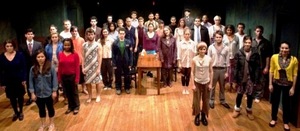SITE GUIDE
SEARCH
REVIEWS
REVIEW ARCHIVES
ADVERTISING AT CURTAINUP
FEATURES
NEWS
Etcetera and
Short Term Listings
LISTINGS
Broadway
Off-Broadway
NYC Restaurants
BOOKS and CDs
OTHER PLACES
Berkshires
London
California
New Jersey
DC
Connecticut
Philadelphia
Elsewhere
QUOTES
TKTS
PLAYWRIGHTS' ALBUMS
LETTERS TO EDITOR
FILM
LINKS
MISCELLANEOUS
Free Updates
Masthead
A CurtainUp Review
The Great Recession
6 Short Plays by Thomas Bradshaw, Sheila Callaghan, Erin Courtney, Will Eno, Itamar Moses and Adam Rapp
By Elyse Sommer
|
It's happening— note on a slip of paper handed to the arriving audience members by the clownlike host who for all his geniality is a character in the macabre opening play, Clasic Kitchen Timer.
|

The full company of Bats at curtain call
|

Nick Maccarone in Classic Kitchen Timer by Adam Rapp
|
Now the Flea's artistic director has commissioned Eno and Moses as well as four other cutting edge playwrights to each create a ten-minute play about the current economic crisis. To add to the challenge, the playwrights were directed to focus on the recession's impact on the younger generation, not the middle aged and older. Though each play was to have its own director, the design team would be the same. While the writers were limited by the demand to keep things short, there was no limit on the number of characters. All the Bats were ready to serve. And so, to start with the ending: You're in for a mighty impressive curtain call!.
If you expect really fresh insights or characters from any of these plays, you'll be disappointed. To the playwrights' credit, they've managed to come up with six quite different situation. As might be expected, several have opted for apocalyptic visions that point to things getting far worse than they are already. Except for these doomsday scenarios the characters lean towards shallowness. But then, that's youth isn't it? And the doomsday scenarios notwithstanding, the folks at the Flea seem more bent on entertaining than enlightening. It starts with the clownish host who greets and chats up the audience and is also part of the first story and continues with a party-like atmosphere at the intermission that has the actors mingling with the audience to sell drinks and pretzels.
By interpreting the younger generation tag of Mr. Simpson's assignment as people in their 20s, the playwrights seem to have eliminated the possibility of family stories that would include teenagers, parents and grandparents. The best part of the evening overall is that each play is energetically performed by the large, attractive cast and is smartly staged with limited resources.
Two plays that fall into the creepy, disastrous category are Classic Kitchern Timer, directed as well as written Adam Rapp, and Sheila Calliaham's apocalyptic Recess which follows the drinks and pretzel intermission. Rapp's contribution is a macabre and literally bloody tale in which a man and a woman (Lucy Norwood and Robert Grant) compete for a bizarre job that will ease their desperate financial circumstancs. Callaghan presents a downbeat view of the recession era. She fills the stage with almost a dozen twenty-something Generation X New Yorkers for whom a life filled with high hopes and lots of Happy Hours has turned into a hell on earth in a shabby Manhattan studio apartment. One young woman seems to be dying or dead, another (Lauren Holland) looks like a concentration camp inmate whose frantic, nonstop exercising is quite harrowing to watch.
Fucked is the most realistic and least populated play. No, it's not by David Mamet who seems to like the F word better than any contermporary playwright (we counted 169 uses of it in his 2008 Broadway play, November) but by Itamar Moses. Like the Flea's all Moses evening ( Love/Stories) it's again directed with flair and polish by Michelle Tattenbaum. When stripped to its not so perfect bones by the offer of a long, free trip, the living together relationship of Cindy and Reed (Jessica Pohly ad Dorien Makhloghi) triggered a lot of knowing laughs from the audience, most of whom looked as if they could be friends and acquaintances — and many of whom probably have been forced to realize that making love might just be the other side of the getting screwed coin. Moses rings in a rare older character (though unseen) for a nice O.Henry twist.
With New York Living, Thomas Bradshaw taps into the popularity of backstage plays, especially those featuring a play within a play. Its cast of wannabe theatrical greats (Andy Gershenzon, Anna Greenfield, Raul Sigmund Julia, Morgan Reis) deal with lost jobs, expensive apartments, sexual frustration — not to mention dreams of Tony Awards. Director Ethan McSweeney succeeds in helping the four characters to tease the maximum laughs from the complications of their rehearsals and living arrangements.
Erin Courtney's Severed combines a documentary about people coping with job layoffs with a romance in the making between a highly educated but rather stereotypical business school graduate known only as Suit (Ronald Washington) and a funky artist named Polka Dot (Amy Jackson) who created a giant Eunich head for a children's entertainment. Though smoothly staged by Davis McCallum, the most apt comment comes from by an interviewee named Michael (Reynaldo Piniella), a young actor who declares"being an actor is a crap job anyway. . .I mean financially. So most actors have some family support or they scrap around temping or waiting tables and they keep their cost of living low. You know? So the recession, in a way, doesn't hit the young actors as hard because we have no money anyway."
The man who dreamed up this whole concept also directs Will Eno's Unum Eno addresses the most recession-related issues and is only one to include a family situation and has been allotted double the allotted ten minutes. The title is short for the Latin "pluribus unuum" which translates into "uniting into one " and is the motto on the U.S dollar bill. Eno uses this as a starting point for following a newly printed dollar bill into a cross section of people variously affected by the recession. It makes for an ambitious concept to round out an enjoyable if spotty and not especially ground breaking enterprise.
|
The Great Recession 6 short plays by Thomas Bradshaw, Sheila Callaghan, Erin Courtney, Will Eno, Itamar Moses and Adam Rapp Featuring The Bats Sets by John McDermott Lighting by Jeanette Yew Costumes by Becky Lasky and Jessica Pabst, Sound by Nathaniel Putnam Fight direction by Alexander Sovronsky. Running Time: 2 hours with one intermission Flea Theater Main Stage 44 White Street From 11/20/09; opening 12/10/09; closing 12/30/09 Plays in order of presentation: CLASSIC KITCHEN TIMER written and directed by Adam Rapp Cast: Greg Coughlin, Jamie Effros, Robert Grant, Nick Maccarone, Jonathan Marballi, Emily Simoness, Dominic Spillane, Sarah Stephens FUCKED by Itamar Moses. Directed by Michelle Tattenbaum. Cast: Dorien Makhlogi, Jessica Pohly NEW YORK LIVING by Thomas Bradshaw Directed by Ethan McSweeny Cast: Andy Gershenzon, Anna Greenfield, Raul Sigmund Julia, Morgan Reis SEVERED by Erin Courtney. Directed by Davis McCallum. An unlikely romance springs up between a cynical artist and a straightforward businessman, while a cross-section of young New Yorkers are interviewed for a documentary on the recession. Cast: Eboni Booth, Jake Green, Amy Jo Jackson, Turna Mete, Reynaldo Piniella, Ronald Washington. RECESS by Sheila Callaghan Directed by Kip Fagan. In the aftermath of an almost apocalyptic recession, a group of 11 twenty-something New Yorkers sharing a studio Cast: Brett Aresco, Greg Coughlin, Thomas Crawford, Jessy Hodges, Laurel Holland, Vella Lovell, Heidi Niedermeyer, Jessica Pohly, Dominic Spillane, Stephen Stout, Ariana Venturi UNUM by Will Eno. Directed by Jim Simpson. Cast: Felipe Bonilla, Louiza Collins, Katherine Folk-Sullivan, Laurel Holland, Josephine Huang, Jonathan Marballi, Kate Michaud, John Russo, Emily Simoness, Chloé Wepper, Wilton Yeung, Marshall York |
|
REVIEW FEEDBACK Highlight one of the responses below and click "copy" or"CTRL+C"
Paste the highlighted text into the subject line (CTRL+ V): Feel free to add detailed comments in the body of the email. . .also the names and emails of any friends to whom you'd like us to forward a copy of this review. You can also contact us at Curtainup at Facebook , Curtainup at Twitter and at our Blog Annex |
|
Subscribe to our FREE email updates with a note from editor Elyse Sommer about additions to the website -- with main page hot links to the latest features posted at our numerous locations. To subscribe,
E-mail: esommer@curtainup.comesommer@curtainup.com
put SUBSCRIBE CURTAINUP EMAIL UPDATE in the subject line and your full name and email address in the body of the message -- if you can spare a minute, tell us how you came to CurtainUp and from what part of the country. |






